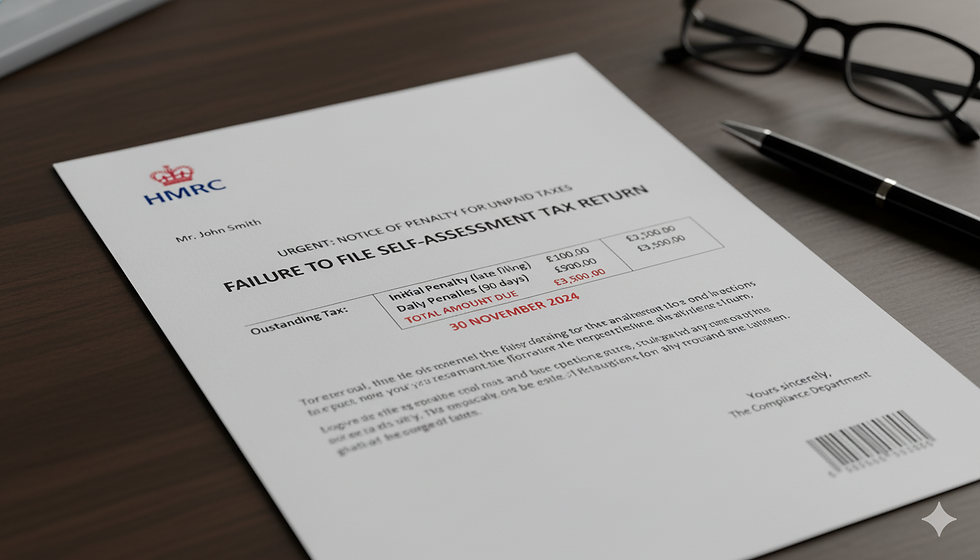Does Facebook Marketplace Count as Trading Income?
- Jenny

- Nov 4, 2025
- 3 min read
Updated: Nov 20, 2025

If you sell informally on Facebook Marketplace (your own items, cash in hand, local pickup, no payment through Meta), then Facebook isn’t “facilitating” the payment, so:
There’s no transaction record in their commerce system
They don’t have payment data to report
In short: If Facebook never handled the money, it won’t report the sale.
And of course, enen if Fcebook does handle the transaction through the Marketplace platform, if they are your own items then no tax or reporting is usually required.
It's worth remebering though, if you sell more than 30 items or £1740, they will report your sales to HMRC and they might write to you.
However; if you are buying and selling items this way, you still need to report it.
HMRC would still see that as income you need to report. The answer depends on what you sell and how often you do it.
Selling personal items – usually not taxable
If you’re selling the odd second-hand item through Facebook Marketplace — things like an old sofa, some clothes, or a phone you no longer need — that’s just personal selling. You’re not trading, and you’re not making a profit from goods you bought to resell. In that case, you don’t need to tell HMRC, and it doesn’t count toward your £1,000 trading allowance. It’s treated the same as selling your own things at a car-boot sale.
Regular selling or running a Facebook Shop
If you use Facebook Shops or a business page to sell regularly, promote your items, or buy stock to resell for profit, that’s trading.
HMRC will expect you to:
Keep records of sales and expenses
Count your Facebook income together with sales from other platforms
Register for Self Assessment if your total trading income is more than £1,000 in a tax year
For example, if you made £800 on Facebook Shops and £600 on eBay, your combined income is £1,400 — so you’ll need to declare it.
What Facebook shares with HMRC
Under new DAC7 rules, Facebook (Meta) is classed as a “digital platform operator.” This means it may share seller information with HMRC — but only for people using its commerce features such as Facebook Shops or Checkout, not for casual Marketplace users selling one-off personal items.
So if you run a Facebook Shop or regularly sell for profit, your data can be reported automatically.
How to record it
If you’re trading, treat Facebook just like any other platform. In your Sole Seller Tax spreadsheet, just select 'Facebook' in the 'Platform' column.
You can then self-select either 'own item' or 'trading item' it's up to you.
In summary
Type of selling | Example | Taxable? | Reported to HMRC? |
Personal / one-off | Old furniture, clothes | No | No |
Regular trading | Handmade items, reselling goods | Yes | Possibly |
Facebook Shop / business page | Promoted regular sales | Yes | Yes |
If you’re unsure, the rule of thumb is simple: if you’re buying or making things to sell for profit, include them. If you’re just selling your own used items, you can ignore them.
And if you’d like a clear report showing exactly what’s taxable and what isn’t, our Sole Seller Tax Summary does the heavy lifting for you — so you can stay organised and HMRC-ready with confidence.
Don't Get Caught Out
Don't get caught out by the new tax rules!
We’ll calculate your income, costs, and taxable profit — ready for HMRC. Covering 6 April 2024 – 5 April 2025 ready for tthe next filing deadline of 31st January 2026.
Why sellers love it;
Simple: One upload, one clear report
Accurate: Matches HMRC tax year and rules
Self Select: You can self-select 'own items' or 'trading items'
Private: You stay in control of your data
Tax Efficient: Calculates all platform sales and uses best methods of lowering tax
Affordable: Only £39 for the full 2024/25 tax year





Comments